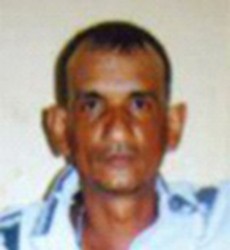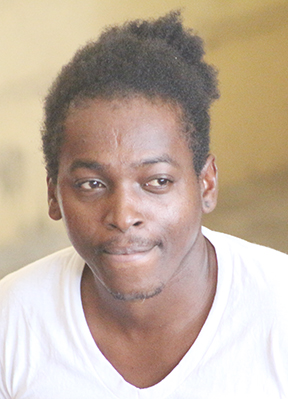Pleading guilty to the charge of manslaughter, Paul James who back in 2015 had identified Hardat Kissoon to another person who would later shoot and kill him in a robbery after leaving a bank, was yesterday afternoon sentenced to 10 years behind bars with time spent awaiting trial to be deducted.
Appearing before Justice Navindra Singh at the High Court in Georgetown, the 40-year-old father of two denied a charge for murder on which he was initially indicted, pleading instead to the lesser offence which stated that on June 1st, 2015 he unlawfully killed Kissoon.
James had originally been indicted for the capital offence to which he pleaded not guilty, but accepted guilt on the lesser charge.

Relating the facts of the case, Prosecutor Tuanna Hardy said that on the day in question, Kissoon had gone to the Robb Street, Georgetown branch of Scotiabank to transact business and had subsequently boarded a minibus in which he was shot.
She said that later that year—in October, James was arrested and during investigations gave a caution statement in which he told police that he was at the bank and had provided information to a person who subsequently shot Hardat.
The prosecutor said that Hardat’s autopsy report revealed that he died of a gunshot injury to the chest.
In mitigation, James’ attorney Adrian Thompson, in begging for leniency, sought to advance that though his client had pointed Hardat out to the shooter, it was not he who had done the shooting; even as he said he understood that his client’s culpability fell within the scope of the felony-murder rule.
Asking, however, for a sentence which would reflect the nature, gravity and prevalence of the offence, Hardy was quick to point out that though James was not the shooter, his actions were the first step to setting in motion the events to follow, which would eventually lead to Kissoon’s death.
She said that the loss suffered by the man’s family was still evident and that they desired justice, even as she added that persons must be free from fear in conducting their business affairs at financial institutions.
In his address, Justice Singh said that whether James had followed Kissoon and inflicted the injuries or not, it did not minimize his role in the man’s death.
Referencing Thompson’s report of his client being a model prisoner and involved in rehabilitative activities behind bars, however, Justice Singh expressed the belief that James may have turned his life around.
The judge said he also considered the man’s early guilty plea as a first-step in accepting responsibility for his actions, which he said also, represented change.
In all the circumstances, Justice Singh said that he was imposing a sentence of 10 years, from which the prison is to deduct time James would have spent on remand awaiting trial.
Before wishing him “good luck,” the judge admonished James to use his remaining time behind bars to think of ways of meaningfully contributing to society after he is released.
James had been jointly charged with Kirk Clarke and Sherwin Trotman, both of whom perished in the 2017 fire at the Camp Street Prison in which 17 prisoners died.
Kissoon, a rice farmer, was shot dead and robbed of a bag of money aboard a minibus in the vicinity of the University of Guyana (UG) Road, Turkeyen, East Coast Demerara.
He died instantly after being shot once in the chest by a gunman who escaped on a motorcycle which was parked on the UG access road with a bag containing cash. At the time of the attack, the rice farmer was returning from a city bank, where he had cashed a cheque for over half a million dollars.
According to reports, from all indications, the gunman followed Kissoon to the Route 44 bus park after he left the bank. When the father of three boarded the minibus to travel back to his Cane Grove, Mahaica home, the gunman jumped in and ensured that he sat close to him.
During the journey, the gunman was constantly on this cellphone. As the bus was proceeding along the East Coast Highway, the gunman requested to be put off at UG road, where he carried out the attack.
In his mitigating address, Thompson said that his client had no antecedents and wanted to accept responsibility for his actions since last year, but that it has only now been made possible for him to so do.
He said, too, that while behind bars, James had written the CSEC Examinations and participated in arts and craft and a number of other programmes for which he has been awarded certificates.
The lawyer said, too, that the electrician was engaged to be married at the time of his arrest.
Kissoon’s wife, mother and brother were present in court for the sentencing.





